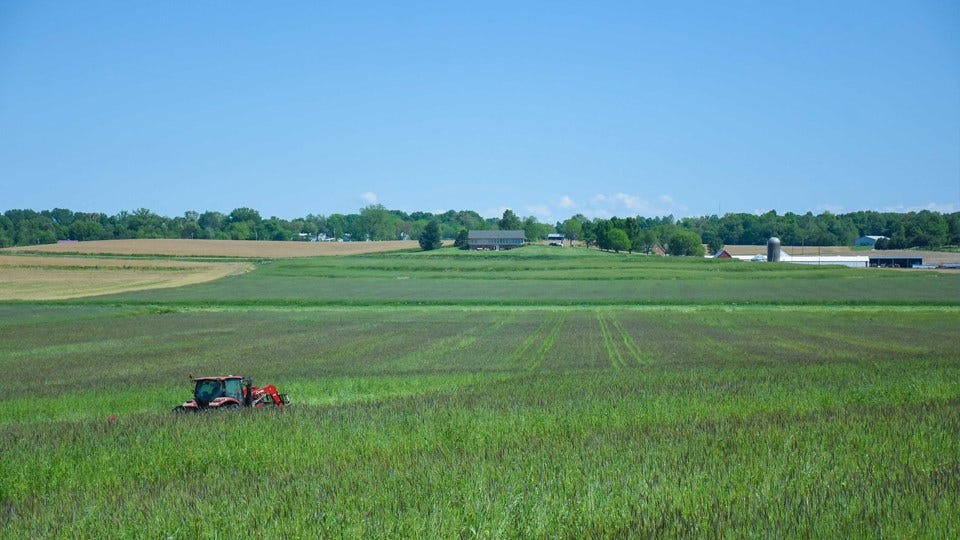Rural viability, taxation among Indiana Farm Bureau’s legislative priorities
Subscriber Benefit
As a subscriber you can listen to articles at work, in the car, or while you work out. Subscribe Now
Leaders with the Indiana Farm Bureau (INFB) are preparing to meet with legislators to discuss the organization’s recently approved policy priorities for the upcoming legislative session.
The INFB says it will focus on three key issues: rural viability; taxation and fiscal policy; and land use and property rights.
“When policies are considered by the General Assembly this year, it will be important for them to consider what will keep agriculture growing,” INFB President Randy Kron said in a news release. “One in 10 Hoosiers work in the ag ecosystem, so policies that impact agriculture have a ripple effect beyond the farm gate.”
In an interview with Inside INdiana Business, INFB Executive Director of Public Policy Andy Tauer said the focus on rural viability came from conversations with members, and infrastructure is a key component.
“[We] continue to work with the General Assembly and others on rural roads and bridges primarily in this space,” Tauer said. “As our our members’ equipment continues to grow and advance, how do we make sure as local or state projects advance forward that they’re they’re looking at the future size and demands of agriculture in those rural communities?”
Additionally, Tauer noted that while Indiana has made investments in expanding broadband to rural communities, the bureau wants to make sure that the state can get broadband to the “last acre.”
“As technology increases and the technology and the equipment that our members are utilizing on the farm, how can they start to be able to make real time decisions with utilization of broadband?”
Workforce also remains a challenge in Indiana’s agriculture industry, and the bureau seeks to address two barriers to members finding the talent they need: access to child care and food security.
During the 2023 legislative session, property taxes for homeowners was a big topic. The INFB said state and local tax reform will be a major priority for the 2024 session, especially with regard to the adjusting the state’s farmland formula to “create more uniformity in assessments.”
“Indiana Farm Bureau will be standing up a tax task force to really look at how do we set our members in rural Indiana up for future facing tax conversations, both from a state and local perspective, as more and more demands are put on those tax dollars every year,” Tauer said.
Tauer said consumers want prices at the grocery store to go down, and one way to do that is to “control the tax burden placed on Hoosier producers.”
The final priority is over land use and property rights, which the bureau says continue to be threatened by development. A key component of that priority will be water, Tauer said, specifically with regard to water quantity conservation.
Tauer said the issue has been propped up recently with the controversy over using water from the Wabash River in Tippecanoe County to support the LEAP Innovation and Research District in Boone County.
While the LEAP issue is getting the most attention right now, Tauer said the bureau has been hearing about water challenges in other parts of the state over the last couple of years.
“Without water, we can’t grow some of the crops that we need to grow here,” he said. “And so if we’re going to continue to have this balance between, you know, advanced, advanced technologies and agriculture, we too need to be at the table and considered a priority when it comes to the water needs of the state of Indiana.”
Farmland preservation is another key component of the third priority, Tauer said. The bureau aims to ensure that legislators and Hoosiers in general see the value of the state’s farmland and the need to preserve it, rather than just seeing it as undeveloped land that’s waiting for something else to replace it.
The INFB’s policy priorities are developed annually from feedback from members in all 92 Indiana counties. Those recommendations are brought before a resolutions committee to be considered, and the key issues are then selected by the bureau’s board of directors.
Leaders and staff from the bureau will meet with legislators to discuss the priorities on Nov. 21 during Organization Day at the Statehouse. The INFB says those conversations will continue when the short legislative session begins in January.
